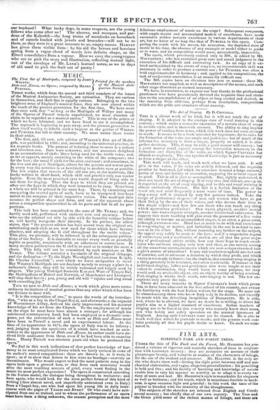The Art of Singing. By D. CRIVELLI.
Tins is a clever work of its kind, but it will not teach the art of singing. It is adapted to the average state of vocal training in this country ; which seeks a memoriter execution of a certain class of songs in certain style, and is therewith content. The ability to sing implies the power of reading from notes, which this work does not even attempt to teach. It seems to be a book intended for beginners ; fonts rules for the formation of the voice are ample and judicious; but of much of the informa ion necessary to form a singer, properly so called, it is alto- gether destitute. This, it may he said, a good master will convey ; bat a good master could equally convey the instruction necessary to the formation and discipline of the voice, on which Signor CRIVELLI has dilated so copiously. The one species of knowledge is just as necessary to form a singer as the other.
This work will teach, and teach well, what we have said. It will give to the voice, if its rules are strictly followed, and the requisite practice be bestowed, (of which its exercises demand a large amount,) purity of tone and facility of execution, supposing the natural organ to be good. This is all it aims to accomplish. But, rightly understood, it does not teach the art of singing. It is very true that this art, among US, is regarded as the art of song-singing, and to this end vocal training is almost exclusively directed. But this is a foolish limitation of the vocal art, and most frequently a mere waste of time. The power to sing a song well is attained by very few persons indeed. Take the range of professional singers—of men and women who have to get their living by the use of their voices, and who devote their lives to this single object—and how few are there who can reach any thing which approaches perfection ! One wants physical, another mental power; one wants organic strength, another intellectual cultivation. TO suppose that mere teaching will give even the possessor of a fine voice the ability to become an accomplished singer, is an error, a gross error, although a common one. Mind has as much to do with real excellence in song-singing as matter, and imbecility in the one is as fatal to suc- cess as in the other. But, without reasoning any further on the subject, the appeal may safely be made to the fact : and if a respectable degree of correctness and a mediocrity of station are all that the great majo- rity of professional artists attain, how can those hope to reach excel- lence who cultivate singing only now and then, as one merely among all the numerous accomplishments which are now-a-days crammed into a girl's course of education ? It may suit teachers to uphold another sort of doctrine, and to advocate a delusion by which they profit, and which vanity is too ready to foster ; but the truth is, that amateur song-singing is a thing generally to be tolerated, and often intolerable. If instead of this individual display, ladies and gentlemen also were taught to use their voices in combination, they would learn to some purpose, tor they would seek an attainable object, and an object worthy of being attained. Part-singing is within their reach, solo-singing is not. The few ex- ceptions only prove the rule. There are many remarks in Signor CRIVELLI'S book which prove him to have been educated in the best school of his country, and evince his familiarity with the best Italian writers for the stage. He must not be classed among those who know Italy only in its decline, and identify its music with the drivelling instpidities of Dosmorm. He is able, and, where he is allowed, we have no doubt he is willing, to direct his pupil's aim to a higher standard of excellence. Italian teachers of singing are to be found in this country who scarcely know their notes, and s ho boldly and safely speculate on the musical ignorance of England. Among such CR1VELLI mug not be classed. He is able to teach well that which he pretends to teach ; and the present work con- tains probably all that his pupils desire to know. To such we com- mend it.


























 Previous page
Previous page